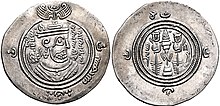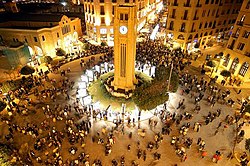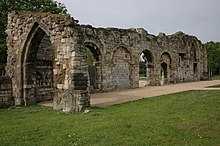Portal:History
The History Portal
History (derived from Ancient Greek ἱστορία (historía) 'inquiry; knowledge acquired by investigation') is the systematic study and documentation of the human past. History is an academic discipline which uses a narrative to describe, examine, question, and analyze past events, and investigate their patterns of cause and effect. Historians debate which narrative best explains an event, as well as the significance of different causes and effects. Historians debate the nature of history as an end in itself, and its usefulness in giving perspective on the problems of the present.
The period of events before the invention of writing systems is considered prehistory. "History" is an umbrella term comprising past events as well as the memory, discovery, collection, organization, presentation, and interpretation of these events. Historians seek knowledge of the past using historical sources such as written documents, oral accounts or traditional oral histories, art and material artifacts, and ecological markers.
Stories common to a particular culture, but not supported by external sources (such as the tales surrounding King Arthur), are usually classified as cultural heritage or legends. History differs from myth in that it is supported by verifiable evidence. However, ancient cultural influences have helped create variant interpretations of the nature of history, which have evolved over the centuries and continue to change today. The modern study of history is wide-ranging, and includes the study of specific regions and certain topical or thematic elements of historical investigation. History is taught as a part of primary and secondary education, and the academic study of history is a major discipline in universities.
Herodotus, a 5th-century BCE Greek historian, is often considered the "father of history", as one of the first historians in the Western tradition, though he has been criticized as the "father of lies". Along with his contemporary Thucydides, he helped form the foundations for the modern study of past events and societies. Their works continue to be read today, and the gap between the culture-focused Herodotus and the military-focused Thucydides remains a point of contention or approach in modern historical writing. In East Asia a state chronicle, the Spring and Autumn Annals, was reputed to date from as early as 722 BCE, though only 2nd-century BCE texts have survived. The title "father of history" has also been attributed, in their respective societies, to Sima Qian, Ibn Khaldun, and Kenneth Dike. (Full article...)
Featured picture
Did you know (auto generated)

- ... that soccer player Danielle Marcano scored four goals in back-to-back games that helped to send the University of Tennessee to the NCAA tournament quarterfinals for the first time in history?
- ... that no one laughed at the worst joke in legal history?
- ... that a poem by Moses da Rieti includes an encyclopedia of the sciences, a Jewish paradise fantasy, and a post-biblical history of Jewish literature?
- ... that historically, lichens like Umbilicaria torrefacta have been used to naturally dye traditional Scottish tartans and textiles?
- ... that at over 400 pounds (180 kg), Desmond Watson is one of the largest players in NCAA Division I football history?
- ... that Hanning Schröder, who in the 1930s played historical instruments in the Harlan Trio together with his wife, was recognised as Righteous Among the Nations?
Neferefre Isi (also known as Raneferef, Ranefer and in Greek as Χέρης, Cherês; c. 2480 BC - c. 2458 BC) was an ancient Egyptian king of the Fifth Dynasty during the Old Kingdom period. He was most likely the eldest son of king Neferirkare Kakai and queen Khentkaus II. He was known as prince Ranefer before he ascended to the throne.
Neferefre started a pyramid for himself in the royal necropolis of Abusir called Netjeribau Raneferef, which means "The bas of Neferefre are divine". The pyramid was never finished, with a mason's inscription showing that works on the stone structure were abandoned during or shortly after the king's second year of reign. Together with the sparsity of attestations contemporaneous with his reign, this is taken by Egyptologists as evidence that Neferefre died unexpectedly after two to three years on the throne. Neferefre was nonetheless buried in his pyramid, hastily completed in the form of a mastaba by his second successor and presumably younger brother, pharaoh Nyuserre Ini. Fragments of his mummy were uncovered there, showing that he died in his early twenties. (Full article...)
On this day
November 29: Black Friday in the United States (2024); Liberation Day in Albania
- 1781 – The crew of the British slave ship Zong, running low on water, began the killing of more than 130 enslaved African people by throwing them into the sea to claim insurance.
- 1810 – Napoleonic Wars: British troops rendezvoused at Grand Baie to launch an invasion of Isle de France, now known as Mauritius.
- 1924 – The Bronx County Bird Club was formed and would go on to lead the Audubon Society's Christmas Bird Count in the eastern US for three years in a row.
- 1963 – Five minutes after taking off from Montréal–Dorval, Trans-Canada Air Lines Flight 831 crashed in bad weather, killing all 118 people on board.
- 1972 – Atari announced the release of Pong (screenshot pictured), one of the first video games to achieve widespread popularity in both the arcade and home-console markets.
- 2012 – In resolution 67/19, the United Nations General Assembly voted to accord the status of a non-member observer state to Palestine.
- Christian Doppler (b. 1803)
- George Brown (b. 1818)
- Adam Clayton Powell Jr. (b. 1908)
- Yōichi Masuzoe (b. 1948)
Selected quote
Time's glory is to command contending kings,
To unmask falsehood, and bring truth to light.— William Shakespeare, playwright
Related portals
More Did you know...
- ... that Giovanni de Ventura, a plague doctor who may have worn a beak doctor costume (pictured), was restricted by a covenant to treat only infectious patients? In the nose of the mask, there were types of plants that were used to filter the sickness from the wearer.
- ... that in some archaic Greek alphabets, an Ε could look like a Β, a Β like a C, a Γ like an Ι, an Ι like a Σ, or a Σ like an Μ?
- ... that the Chinese government has published a list of sixty-four important cultural relics that are forbidden to be exhibited outside of China?
- ... that the 1886 novel Albertine expedited the abolition of public prostitution in Norway?
- ... that Carl Sagan worked with the US Air Force on detonating a nuclear device on the Moon?
- ... that Olympic gold medals have been made out of silver, jade, and glass?
- ... that in 1945 a Japanese battalion was rearmed to serve alongside the British 5th Parachute Brigade in the Far East?
- ... that Solomon was accidentally castrated as an infant?
Topics
Categories

History • By period • By region • By topic • By ethnic group • Historiography • Archaeology • Books • Maps • Images • Magazines • Organizations • Fictional • Museums • Pseudohistory • Stubs • Timelines • Chronology • People • Wikipedia historians
WikiProjects
![]() WikiProject History •
Ancient Near East • Australian History • Classical Greece and Rome • Dacia • Former countries • History of Canada • Chinese history • European history • Heraldry and vexillology • Indian history • Jewish history • Medieval Scotland • Mesoamerica • Military history • Middle Ages • History of Science
WikiProject History •
Ancient Near East • Australian History • Classical Greece and Rome • Dacia • Former countries • History of Canada • Chinese history • European history • Heraldry and vexillology • Indian history • Jewish history • Medieval Scotland • Mesoamerica • Military history • Middle Ages • History of Science
WikiProject Time • Days of the Year • Years
WikiProject Biography • Composers • Political figures • Saints • United States Presidents
Things you can do
 |
Here are some tasks awaiting attention:
|
Associated Wikimedia
The following Wikimedia Foundation sister projects provide more on this subject:
-
Commons
Free media repository -
Wikibooks
Free textbooks and manuals -
Wikidata
Free knowledge base -
Wikinews
Free-content news -
Wikiquote
Collection of quotations -
Wikisource
Free-content library -
Wikiversity
Free learning tools -
Wiktionary
Dictionary and thesaurus

























































